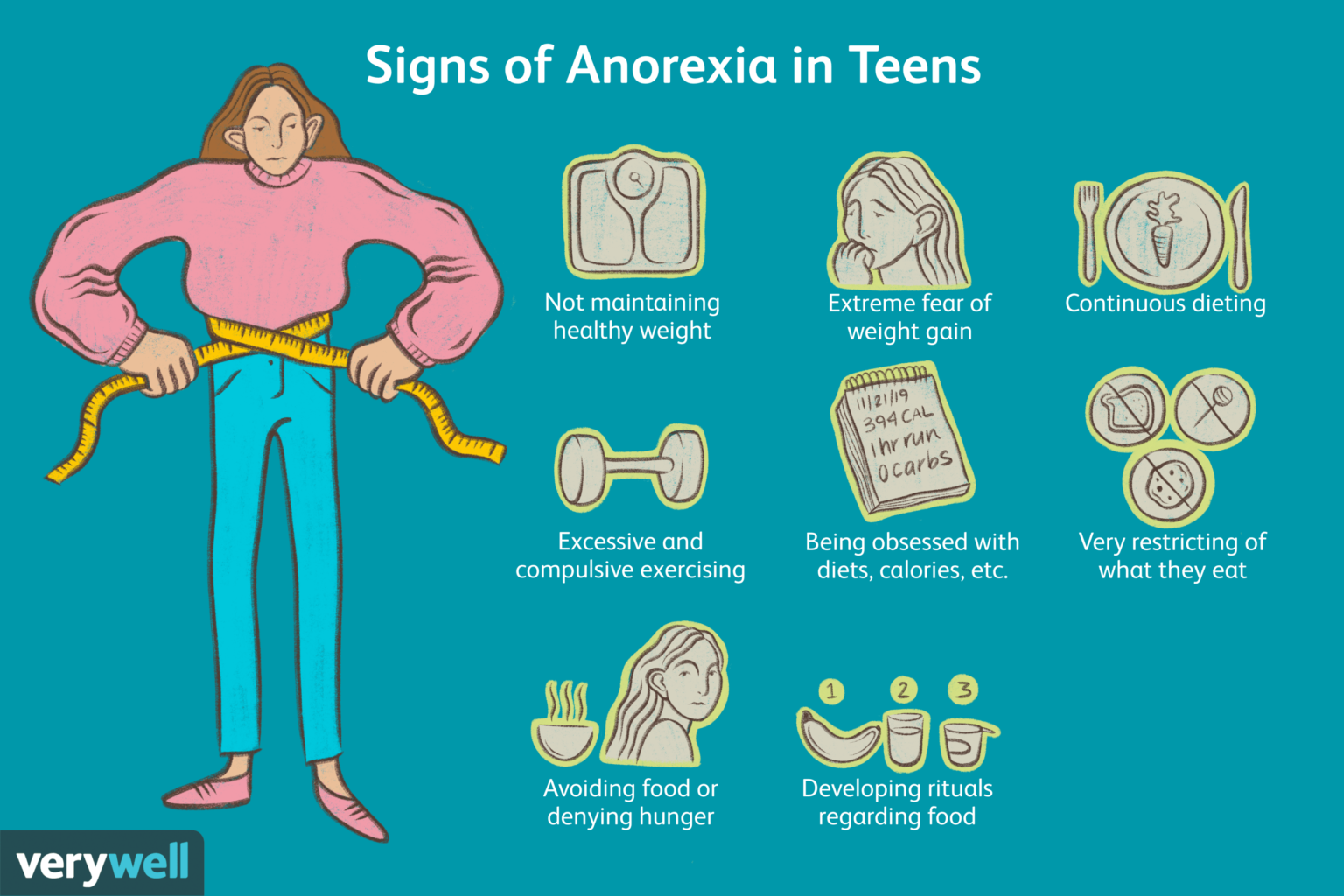Anorexia nervosa is a serious, and sometimes deadly, eating disorder that impacts 0.3% to 0.4% of young women in the United States. Adolescents between ages of 15 and 24 with anorexia have 12 times the risk of dying compared to their same-aged peers. Because the disease often starts in the teen years and can be fatal if not treated, it’s important for parents to know the signs of anorexia in teens.
Signs of Anorexia in Teens
Anorexia nervosa is an eating disorder that causes the person to severely restrict what they eat or drink. A person with anorexia is often underweight, but continues to feel overweight or “fat.” There is often a great fear of gaining any weight, despite the fact that the person is underweight.
There are many and varied signs of anorexia in teens, including physical as well as emotional/behavioral symptoms. Not all teens with anorexia nervosa are emaciated. Anorexia nervosa can also be diagnosed in individuals who have recently lost a lot of weight and are what many would consider “normal weight.”
Physical Signs:
Dry skin or skin rashErosion of tooth enamelFeeling coldPoor nail qualityThinning hair
Emotional or Behavioral Signs:
Frequently skipping meals with family and/or denying hungerAnxiety at mealtimes, claiming they have already eaten, and/or making excuses to avoid mealsPrepping elaborate meals for friends or family but rarely eating themCutting food into tiny pieces or moving it around to look like they’re eatingWearing big, baggy clothing to cover up their bodyWithdrawing from friends and skipping social functionsSpending an excessive amount of time at the gym or training for sportsComplaining about being “fat” or obsessing over “flawed” parts of their bodyFocusing on nutritional labels in an excessive way or constantly trying restrictive diets (like eating no carbs or no fat)Being moody, anxious, or depressedDeveloping rituals regarding food (eating food in a certain order, excessive chewing, etc.)
Consequences
Teens with anorexia nervosa deprive their bodies of sufficient calories and nutrients, which can lead to a variety of physical health consequences, including:
Anemia (iron deficiency)Amenorrhea—if the anorexic is female, she may never get her first period, or her periods may stop or become less frequentBrittle bones (osteoporosis)Decreased testosterone (in boys with eating disorders)Decreased thyroid hormoneDehydration/kidney failureDelayed physical maturation (due to decreased growth hormone)Dry skinEdema (swelling)Electrolyte imbalance (which can lead to seizures)Gastrointestinal problems (bloating, constipation)Growth of fine, downy hair over the body (lanugo)Hair lossHeart diseaseInfertilityIrregular or abnormally slow heart rateFaintingLow blood pressureMemory loss/disorientationMuscle weakness and loss of musclePoor circulationWeakness and tiredness
In addition to physical complications, anorexia has been linked with a variety of emotional and mental health consequences, including low self-esteem. Many adolescents with anorexia are often hard-driving perfectionists.
Despite the fact that they usually get good grades and excel in after-school activities, they often have low self-esteem and a need to control the people and things around them. These personality traits might be obvious or they might be subtle, but they can point towards a tendency towards anorexia.
Teens with anorexia nervosa can also have co-occurring mental health disorders, including:
Anxiety disordersDepressionSubstance use disorder
Treatment for Anorexia in Teens
If you suspect your teen may have an eating disorder, seek immediate treatment. Talk to your teen’s physician about your concerns and discuss treatment options, which often aim to:
Restore weight and nutrition that has been lost to severe dieting and purgingTreat any psychological disturbances, such as distortion of body image, low self-esteem, and interpersonal or emotional conflictsAchieve long-term remission and rehabilitation, or full recovery
There’s no one-size-fits-all treatment, but there has been significant advances in treating adolescents with anorexia over the past decade. Treatment should be guided by a physician and mental health professional who address the psychological and physical health of a teen throughout the treatment process.
Early intervention improves the chances for a teens’ successful recovery from an eating disorder, so don’t wait to seek treatment for your loved one. Your first step may be reaching out to your teen’s primary care physician about eating disorders, the signs you may be noticing, and potential ways to help.
Treatment for an eating disorder may consist of nutritional rehabilitation and psychotherapy, including individual therapy (adolescent-focused therapy), family therapy (systemic family therapy), or even residential treatment. There are no FDA-approved medications for the treatment of anorexia.
A Word From Verywell
Caring for a teen with an eating disorder can be scary and overwhelming, and unfortunately, there is no easy fix. Because of the complicated nature of the disease, enlisting the help of professionals along with other parents who have experience with eating disorders is key. Start today by educating yourself on the signs of anorexia, building a solid support system, and reminding yourself that recovery for your teen is possible.
Thanks for your feedback!
What is your feedback?
Helpful
Report an Error
Other

